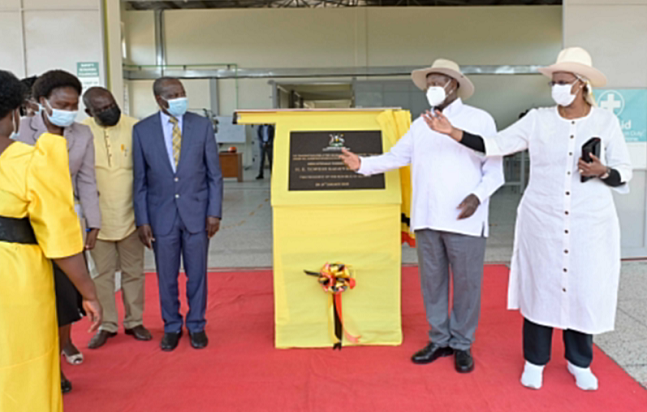Justine Kasule Lumumba, the Minister, Office of the Prime Minister (General Duties) making her remarks
Government is committed to investing in coffee value addition and transforming Uganda’s economy, Prime Minister Robinah Nabbanja has said.
In a message delivered by Justine Kasule Lumumba, the Minister, Office of the Prime Minister (General Duties) at the official opening of the recently concluded National Coffee Dialogue on developing Uganda’s coffee value chain that took place from 10th to 11th January 2023 at Lake Victoria Serena Hotel, Kigo, Nabbanja said the Office of the Prime Minister is responsible for coordinating the implementation of the coffee roadmap which was launched by President Yoweri Museveni in 2017.
The two-day event was organized by the Office of the President in conjunction with Operation Wealth Creation (OWC) and Uganda Coffee Development Authority (UCDA).
“In order for us to achieve the coffee roadmap targets, there is need to transform the coffee sub sector through the nine initiatives under the three pillars of demand and value addition, production and enablers,” Nabbanja said.
She added: “This transformation will support Uganda’s socio-economic development through increased export earnings predicted at 1.5 billion US dollars (Shs5.5 trillion) by 2025, improved livelihoods by over 1,800,000 people, increased financing and investments and a premium price for Uganda coffee due to strong branding.”
She said that since the launch of the coffee roadmap in 2017, the President has been following its implementation.
In a letter dated 2nd October 2022, entitled ‘organizing Uganda’s coffee value chain’, Museveni raised a number of questions on the coffee sector, especially regarding coffee value addition, industrial production and trade implications.
These specific questions raised by the President were as follows;
Are there are no benefits for the consumer for the coffee to be processed at source? May it not be cheaper given the lower cost of labor? Are there no advantages for the coffee grower in having the coffee processed at source? May he or she not earn more?
Are there no advantages for the coffee growing countries to have the coffee processed at source? Will the country not earn more foreign exchange? Will the country not create more jobs for citizens?
Are there no advantages for the coffee consuming countries to have the coffee processed at source? If Japan buys processed coffee from Uganda and gives Uganda more money, won’t the Ugandans buy more Japanese vehicles?
“The above questions point to an urgent need to revisit our plans and investments in the coffee sub sector as a country and to enable it to contribute more effectively to the socio-economic transformation of Uganda,” Nabbanja said, adding that the NRM Government considers the coffee sector as an important contributor “to our goal of achieving socio- economic transformation of our country.”
She said Government efforts of increasing coffee production through Operation Wealth Creation and Uganda Coffee Development Authority over the last decade have generated significant successes. “For example, Uganda’s coffee exports grew from 2 million 60kg bags in Financial Year 2005/2006 to 8 million bags in Financial Year 2021/22. In value terms, coffee contributed 22% of all export earnings estimated at 862 million US dollars in the Financial Year 2021/22. Uganda is currently ranked number seven among the largest coffee producers and ranked number three globally in terms of best coffee quality,” she said.
Government says to consolidate the above achievements and sustain the international competitiveness of coffee as a commodity, the sector requires close regulation.
“As government, we are concerned that the sector continues to be externally focused when it comes to value addition; we donate wealth and jobs to consumer countries when we export unprocessed coffee beans to consumer nations,” the PM said, adding that Uganda must move to the next level by attracting investment to establish processing capabilities aimed at value addition in the country.
“As a country, we need to produce finished coffee products including soluble coffee, roasted and ground coffee for domestic market, regional and other export markets,” she said.
She challenged participants to address the historical injustices in the coffee sector “which have worked against the development of Uganda’s coffee industry”
She said: “For example, where is the coffee farmer in this? How do we mobilize internal and local funding for value addition in the sector? Based on our historical experiences in coffee agronomy, production and regulation, how can Uganda reap dividends to support the development of other related crops?”
On her behalf, Lumumba, who is also a coffee farmer, said Uganda’s coffee is good.
“It can talk for itself, but why is our coffee branded different names? Can we please own what we own (produce)! We don’t own for others but ourselves,” Lumumba said, adding that Uganda coffee should be the flagship brand for the country.
She advised stakeholders to push for a portion of money that goes to the Uganda Development Bank.
“You are one sub sector that is really pushing Ugandans in most parts of the country to make sure we fight poverty. So, you hurt nobody if you can push for a percentage that must be caged for you because you are a crop that can work in most districts of Uganda;
coffee can rescue many of us from poverty,” Lumumba said, adding that even those with one acre can get out of poverty if they practice what UCDA teaches them.
“I also want you to put more pressure on Government. As Government is bringing out programs for irrigation, do we take coffee as a priority? We need water on the farms,” she said.






